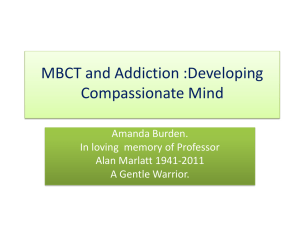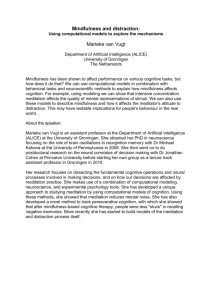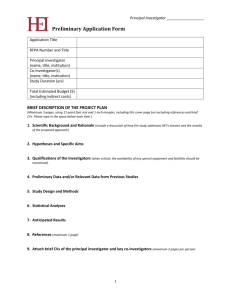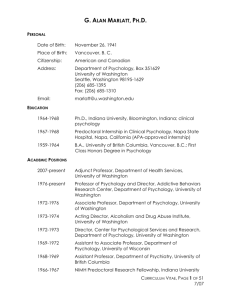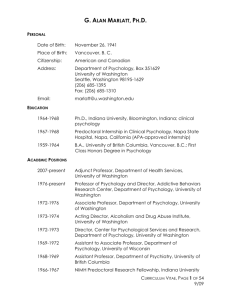Biographical Sketch Format Page
advertisement
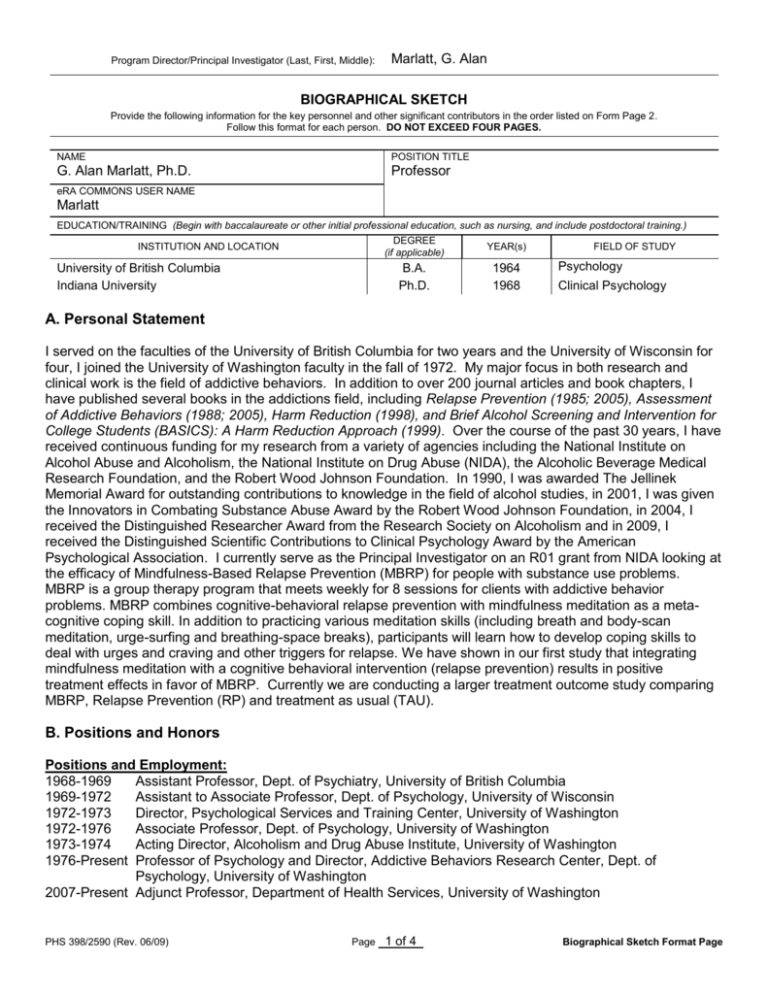
Program Director/Principal Investigator (Last, First, Middle): Marlatt, G. Alan BIOGRAPHICAL SKETCH Provide the following information for the key personnel and other significant contributors in the order listed on Form Page 2. Follow this format for each person. DO NOT EXCEED FOUR PAGES. NAME POSITION TITLE G. Alan Marlatt, Ph.D. Professor eRA COMMONS USER NAME Marlatt EDUCATION/TRAINING (Begin with baccalaureate or other initial professional education, such as nursing, and include postdoctoral training.) INSTITUTION AND LOCATION University of British Columbia Indiana University DEGREE (if applicable) YEAR(s) B.A. Ph.D. 1964 1968 FIELD OF STUDY Psychology Clinical Psychology A. Personal Statement I served on the faculties of the University of British Columbia for two years and the University of Wisconsin for four, I joined the University of Washington faculty in the fall of 1972. My major focus in both research and clinical work is the field of addictive behaviors. In addition to over 200 journal articles and book chapters, I have published several books in the addictions field, including Relapse Prevention (1985; 2005), Assessment of Addictive Behaviors (1988; 2005), Harm Reduction (1998), and Brief Alcohol Screening and Intervention for College Students (BASICS): A Harm Reduction Approach (1999). Over the course of the past 30 years, I have received continuous funding for my research from a variety of agencies including the National Institute on Alcohol Abuse and Alcoholism, the National Institute on Drug Abuse (NIDA), the Alcoholic Beverage Medical Research Foundation, and the Robert Wood Johnson Foundation. In 1990, I was awarded The Jellinek Memorial Award for outstanding contributions to knowledge in the field of alcohol studies, in 2001, I was given the Innovators in Combating Substance Abuse Award by the Robert Wood Johnson Foundation, in 2004, I received the Distinguished Researcher Award from the Research Society on Alcoholism and in 2009, I received the Distinguished Scientific Contributions to Clinical Psychology Award by the American Psychological Association. I currently serve as the Principal Investigator on an R01 grant from NIDA looking at the efficacy of Mindfulness-Based Relapse Prevention (MBRP) for people with substance use problems. MBRP is a group therapy program that meets weekly for 8 sessions for clients with addictive behavior problems. MBRP combines cognitive-behavioral relapse prevention with mindfulness meditation as a metacognitive coping skill. In addition to practicing various meditation skills (including breath and body-scan meditation, urge-surfing and breathing-space breaks), participants will learn how to develop coping skills to deal with urges and craving and other triggers for relapse. We have shown in our first study that integrating mindfulness meditation with a cognitive behavioral intervention (relapse prevention) results in positive treatment effects in favor of MBRP. Currently we are conducting a larger treatment outcome study comparing MBRP, Relapse Prevention (RP) and treatment as usual (TAU). B. Positions and Honors Positions and Employment: 1968-1969 Assistant Professor, Dept. of Psychiatry, University of British Columbia 1969-1972 Assistant to Associate Professor, Dept. of Psychology, University of Wisconsin 1972-1973 Director, Psychological Services and Training Center, University of Washington 1972-1976 Associate Professor, Dept. of Psychology, University of Washington 1973-1974 Acting Director, Alcoholism and Drug Abuse Institute, University of Washington 1976-Present Professor of Psychology and Director, Addictive Behaviors Research Center, Dept. of Psychology, University of Washington 2007-Present Adjunct Professor, Department of Health Services, University of Washington PHS 398/2590 (Rev. 06/09) Page 1 of 4 Biographical Sketch Format Page Principal Investigator/Program Director (Last, First, Middle): Marlatt, Alan G. Honors: Society for a Science of Clinical Psychology, American Psychological Association, Distinguished Scientist Award (Division 12, section 3) Washington, DC August 2000. Robert Wood Johnson Foundation, Innovators Combating Substance Abuse Award, November, 2001. Network of Colleges and Universities Committed to the Elimination of Drug and Alcohol Abuse. Visionary Award, Given at the Annual Conference, Seattle, 2002. National Institute on Alcohol Abuse and Alcoholism (NIH) Research Scientist Award, 1987-2008. Research Society of Alcoholism, Distinguished Researcher Award, Given at the Annual Conference, Vancouver, BC, June, 2004. The Harriet Tubman Freedom Award for Outstanding Community Activism and Lifetime Achievement to Improve Health. Awarded in March, 2007, at the Second Annual Health Disparities Conference, New York, New York. Distinguished Scientific Contributions to Clinical Psychology Award. Awarded in August, 2009, at the American Psychological Association Convention, Toronto, Canada. C. Selected peer-reviewed publications (in chronological order). (Publications selected from 159 peer-reviewed publications) 1. Ostafin, B. D., Chawla, N., Bowen, S., Dillworth, T. M., Witkiewitz, K., & Marlatt, G. A. (2006). Intensive mindfulness training and the reduction of psychological distress: A preliminary study. Cognitive Behavioral Practice, 13(3), 191-197. 2. Bowen, S., Witkiewitz, K., Dillworth, T.M., Chawla, N., Simpson, T.L., Ostafin, B., Larimer, M.E., Blume, A.W., Parks, & Marlatt, G.A. (2006). Mindfulness meditation and substance use in an incarcerated population. Psychology of Addictive Behaviors, 20(3), 343-347. PMCID: PMC1989113 3. Witkiewitz, K. & Marlatt, G. A. (2006). Overview of harm reduction treatments for alcohol problems. International Journal of Drug Policy, 17, 285-294. 4. Marlatt, G.A. (2006). Addiction and the middle way. Current Psychology, 25, 155-172. 5. Marlatt, G.A., & Chawla, N. (2007). Meditation and alcohol use. Southern Medical Journal, 100, 451453. 6. Bowen, S., Witkiewitz, K., Dillworth, T.M., & Marlatt, G.A. (2007). The role of thought suppression in the relationship between mindfulness meditation and alcohol use. Addictive Behaviors, 32, 2324–2328. PMCID: PMC1989113 7. Simpson, T.L., Kaysen, D., Bowen, S., MacPherson, L. M., Chawla, N., Blume, A., Marlatt, G.A., & Larimer, M. E. (2007). PTSD Symptomatology, Substance Use, and Vipassana Meditation in an Incarcerated Sample. Journal of Traumatic Stress, 20, 239-249. 8. Ostafin, B.D., & Marlatt, G.A. (2008). Surfing the urge: Experiential acceptance moderates the relation between automatic alcohol motivation and hazardous drinking. Journal of Social and Clinical Psychology, 27, 426-440. 9. Larimer, M.E., Malone, D.K., Garner, M.D., Atkins, D.C., Burlingham, B., Lonczak, H.S., Tanzer, K., Ginzler, J., Clifasefi, S., Hobson, W.G., Marlatt, G.A., (2009). Health care and public service use and costs before and after provision of housing for chronically homeless persons with severe alcohol problems. Journal of the American Medical Association, 301, 1349-1357. 10. Zgierska, A., Rabago, D., Chawla, N., Kushner, K., Kohler, R., Marlatt, A. (2009). Mindfulness Meditation for Substance Use Disorders: A Systematic Review. Substance Abuse, 30, 266-294. 11. Bowen, S.W., Chawla, N., Collins, S.E., Witkiewitz, K., Hsu, S., Grow, J.C., Clifasefi, S.L., Garner, M.D., Douglas, A., Larimer, M.E. & Marlatt, G.A. (2009). Mindfulness-Based Relapse Prevention for Substance Use Disorders: A Pilot Efficacy Trial. Substance Abuse, 30, 295-305. PHS 398/2590 (Rev. 06/09) Page 2 of 4 Continuation Format Page Principal Investigator/Program Director (Last, First, Middle): Marlatt, Alan G. 12. Lustyk, M. K. B., Chawla, N., Nolan, R., & Marlatt, G. A. (2009). Mindfulness Meditation Research: A discussion of safety issues and participant screening procedures. Advances in Mind-Body Medicine, 24, 20-30. 13. Collins, S.E., Chawla, N., Hsu, S., Grow, J., Otto, J, & Marlatt, A. (2009). Language-based Measures of Mindfulness: Initial Validity and Clinical Utility. Psychology of Addictive Behaviors, 23, 743-749. PMCID: PMC2799300 14. Bowen, S. & Marlatt, G. A. (2009). Surfing the urge: Brief mindfulness-based intervention for college student smokers. Psychology of Addictive Behaviors, 23, 666-671. 15. Smith, J.T., Bowen, S., Marlatt, G. A., Potenza, M. N., & Brewer, J. A. (in press). Applying MindfulnessBased Treatments to Co-Occurring Disorders: What Can We Learn from the Brain? Addiction. D. Research Support Ongoing Research Support 1 R01 DA025764-01A1 Marlatt (PI) 8/1/09 - 7/31/11 NIH/NIDA Mindfulness-Based Relapse Prevention: Efficacy and Mechanisms The broad, long-term objective of the proposed randomized clinical trial is to evaluate the efficacy, moderators and mechanisms of change of two cognitive-behavioral aftercare treatments for alcohol and other drug (AOD) use disorders in preventing AID relapse compared to standard aftercare (SA) offered in the community. Role: Principal Investigator 2 T32 AA07455-26 Larimer (PI) 7/1/84 – 6/30/14 NIH/NIAAA Psychology Training in Alcohol Research The purpose of this project is to provide postdoctoral training for psychologists who wish to pursue a career in alcohol research that is geared towards quality research training in the combined areas of etiology and prevention of alcohol abuse and alcohol dependence. Role: Co-Investigator R24 MD001764 Donovan (PI) 09/30/05 – 02/28/13 NCMHHD The Healing of the Canoe This is a collaborative project between the Suquamish Tribe and the Alcohol and Drug Abuse Institute, University of Washington. The overall goal of this collaboration is to work in partnership to plan, implement, and evaluate a community-based and culturally congruent intervention to reduce health disparities and promote health in the Suquamish Tribe, a federally recognized American Indian/Alaska Native reservation community located in the Pacific Northwest. Role: Co-Investigator Downtown Emergency Service Center (DESC) Marlatt (PI) 5/11/09-03/12/10 Treatment Development and Enhancement to a Housing First (HF) Approach This is a continued collaboration to extend and enhance DESC’s HF program by completing a systematic review of program policies and practices to understand the landscape and core components of the 1811 Eastlake project, with an ultimate goal of working towards identifying potential points of intervention and enhancement within this context. Role: Principal Investigator Completed Research 053672 Larimer (PI) 07/15/05 – 2/28/09 Robert Wood Johnson Foundation Housing First: Evaluation of Harm Reduction Housing for Chronic Public Inebriates This study will evaluate the personal effect (change in negative consequences and treatment motivation) and the aggregate tax-payer savings of a novel housing project in which county identified high public PHS 398/2590 (Rev. 06/09) Page 3 of 4 Continuation Format Page Principal Investigator/Program Director (Last, First, Middle): Marlatt, Alan G. service utilizers (emergency room, sobering center, criminal justice system) are offered housing and services without the requirement of abstaining from alcohol. Role: Co-Investigator 5 R21 DA019562-02 Marlatt (PI) 06/15/06 – 2/28/09 NIDA Efficacy of Mindfulness-Based Relapse Prevention This research builds on over 25 years of developing and implementing RP interventions. MBRP incorporates specific alcohol and drug-focused cognitive therapy techniques with an additional emphasis on mindfulness skills, and builds upon the Investigator's prior work on meditation-based interventions. Role: Principal Investigator 5 K05 AA000113-20 Marlatt (PI) 09/28/87 – 08/31/08 NIH/NIAAA Prevention of Alcohol Problems in the University Setting The purpose of this Research Scientist Award is to allow Dr. Marlatt to pursue a full-time research career related to the prevention of alcohol problems in young adults. Role: Principal Investigator 1 R21 AA13942-02 Marlatt (PI) 05/01/03 - 04/30/06 NIH/NIAAA Innovative Approaches to Modeling Alcohol Relapse The broad long-term objective of the project was to develop an empirically-driven model of alcohol relapse risk factors based on the conceptualization of relapse as a complex phenomenon using data from the Relapse Replication and Extension Project. Role: Principal Investigator 5 RO1 AA12321-04 Marlatt (PI) 09/01/99 - 08/31/03 NIH/NIAAA Intervention for Adolescent Indian Drinking The long-term objective was to reduce the negative consequences with alcohol abuse by Native youth. Role: Principal Investigator 5 R21 AA13054-03 Marlatt (PI) 09/30/00 - 08/31/03 NIH/NIAAA The Effects of Meditation on Alcohol Use and Recidivism The long-term objective of the project was to evaluate the effectiveness of a Vipassana meditation program to reduce alcohol use, related consequences, and anti-social behavior in a prison sample. Role: Principal Investigator PHS 398/2590 (Rev. 06/09) Page 4 of 4 Continuation Format Page
